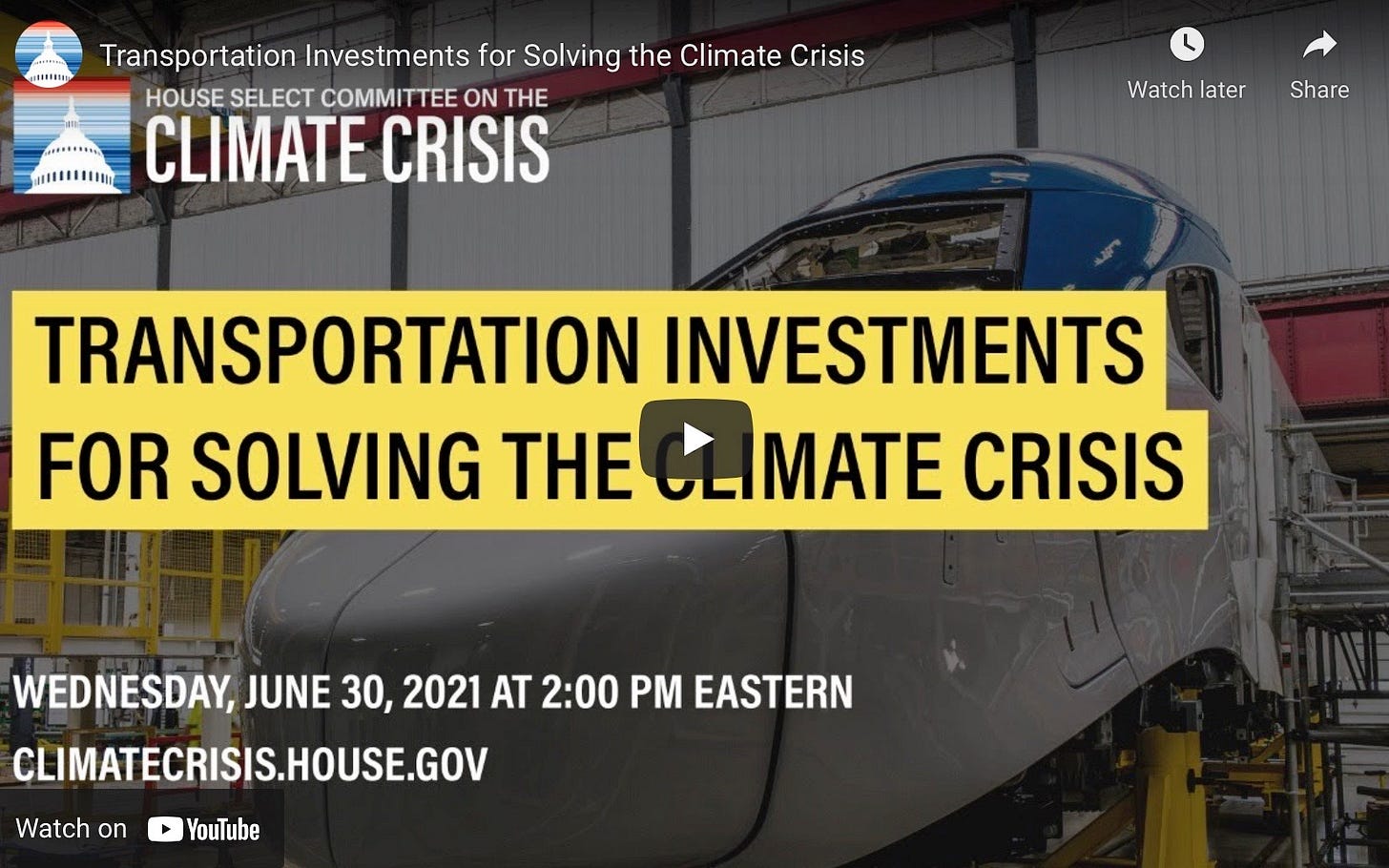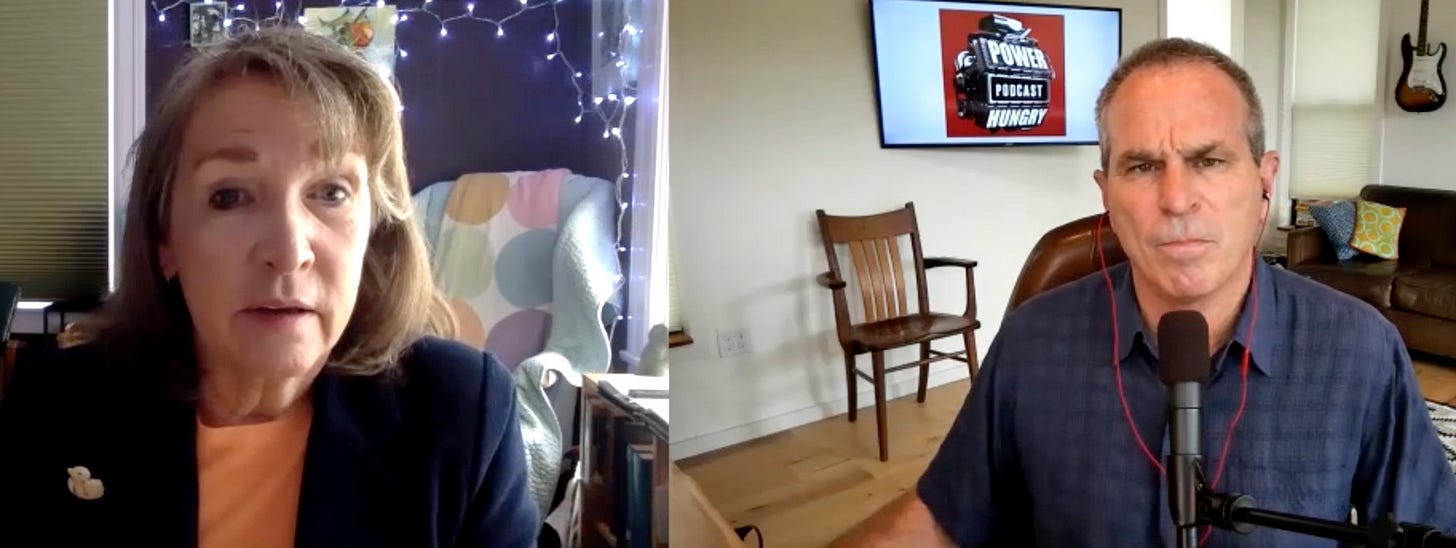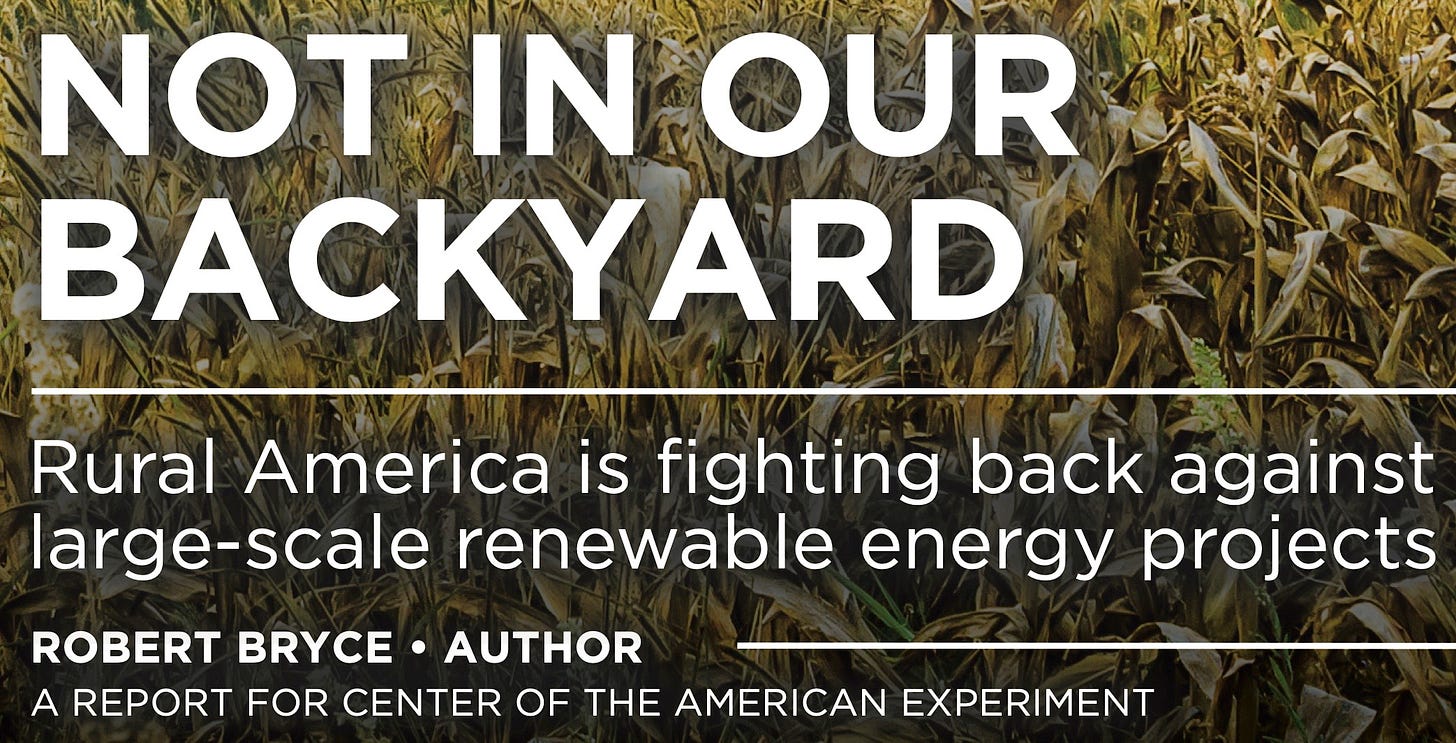My Congressional testimony, a theologian talks CO2 & sin, & Cardinals
My testimony for the House Select Committee on the Climate Crisis on EVs, Sally Vance-Trembath on apocalyptic environmentalism, more about Northern Cardinals
Given the Fourth of July weekend, I’m sending out this blast a day early. I’m going to keep it short as frankly, I’m a little tired. I didn’t plan to write over 5,000 words for my written testimony to the House Select Committee on the Climate Crisis, but once I started writing about EVs, I realized I had a lot to say. As I explained during my five-minute spoken remarks, EVs present problems with affordability, resilience, and supply chains. Three items:
My House testimony on EVs
Sally Vance-Trembath, a theologian, on the podcast
Note about the photo: It's not a Tesla. The photo above is a Library of Congress image from 1919 that I used in my fourth book, Power Hungry. The caption for the photo: "Charging the battery of a Detroit electric automobile."

My testimony on EVs and climate
Yesterday, I testified before Congress. It was the fifth time I have been asked to testify and the second time I’ve been asked to do so while working as a visiting fellow at the Foundation for Research on Equal Opportunity. I’ve been written energy affordability for many years (it was a key tenet of my fourth book, Power Hungry), but my FREOPP affiliation has spurred me to really focus on that issue. Thus, affordability was the first issue I raised. I won’t reproduce all of my remarks in this email, but here are a few of the main points I made:
I’m pro-electricity, but I am adamantly opposed to the notion that we should “electrify everything” including transportation.
EVs are cool. They are not new. The history of EVs is a century of failure tailgating failure. In 1911, the New York Times said that the electric car “has long been recognized as the ideal solution.” In 1990, the California Air Resources Board mandated 10% of car sales be zero-emission vehicles by 2003. Today, 31 years later, only about 6% of the cars in California have an electric plug.
The average household income for EV buyers is about $140,000. That’s roughly two times the U.S. average. And yet, federal EV tax credits force low- and middle-income taxpayers to subsidize the Benz and Beemer crowd.
Lower-income Americans are facing huge electric rate increases for grid upgrades to accommodate EVs even though they will probably never own one
This month, the California Energy Commission estimated the state will need 1.3 million new public EV chargers by 2030. The likely cost to ratepayers: about $13 billion.
Meanwhile, blackouts are almost certain this summer and electricity prices are “absolutely exploding.” California’s electricity prices went up by 7.5% last year and they will likely rise another 40% by 2030. This, in a state with the highest poverty rate and largest Latino population in America. How is racial justice or social equity being served by such regressive policies?
I also talked about resilience, saying “Electrifying everything is the opposite of anti-fragile. Electrifying transportation will put more of our energy eggs in one basket. It will make the grid an even-bigger target for terrorists, cyberthieves, or bad actors. It will reduce resilience and reliability in case of a prolonged grid failure due to natural disaster, equipment failure, or human error."
I also highlighted the myriad supply-chain problems with EVs. Citing work done by the Natural History Museum in London, I said that electrifying half of the U.S. motor vehicle fleet would require in rough terms:
9 times the world’s current cobalt production
4 times global neodymium output
3 times global lithium production
2 times world copper production
I concluded by saying:
Oil’s dominance in transportation is largely due to its high energy density. That density and improvements in internal combustion engines and hybrids assure that oil will be fueling transport for decades to come. Powerful lobby groups want Congress to spend billions on electrification schemes that will impose regressive taxes on low-income Americans, reduce our resilience, and increase reliance on China. That's a dubious trifecta.
The video of the hearing is here. My remarks start at about the 25-minute mark.
My written testimony is available here.


Theologian Sally Vance-Trembath on climate, sin, and carbon credits as modern indulgences
About two years ago, I had a spirited discussion with theologian Sally Vance-Trembath at the Breakthrough Dialogue about the parallels between Christian theology and apocalyptic environmentalism. Those concepts stuck in my head. And after these many months, I finally sat down with her to explore them further. Sally, who is a theologian at Santa Clara University, studies the relationships among the Catholic Church, academia, and wider society. On the podcast, we talked about environmentalism as a religion, climate change, sin, and the similarities between indulgences and carbon credits.
I particularly liked her discussion of how “religion interprets all reality,” and that the growing distrust of institutions of all kinds (and organized religion in particular) has helped fuel the rise of environmentalism as a religion. Michael Shellenberger talks about this trend in his book, Apocalypse Never. He writes “Environmentalism today is the dominant secular religion of the educated upper-middle-class elite in most developed and many developing nations.”
Sally told me that “Religion has these long-term cosmic ideas about it. And sadly, one of those ideas is what happens at the end? How does the world end?” She continued, saying the meaning of our existence is related to the way that the world ends. She went on, “apocalypticism crosses all religion, all religious traditions, because it's one of the ways to answer the question, ‘what's the relationship between me’” and the world?
Sally and I also talked about how apocalypticism has become a central tenet of the climate catastrophists. As I said during our discussion, there’s a lot of “overlap between this idea that we have sinned, and now we'll have to repent and we have to get right with God. And in the Christian tradition, that getting right with God is something we have to do on a personal basis. With climatism, we have to get right with the earth. And we have to go back, and this is one of the things I really want to get back to, is this idea of going back to the garden... and that there's a sin idea here at work, particularly when it comes to the use of hydrocarbons.”
It was a great discussion. Here’s a link.

A radiance, conclave, college, or deck, of Northern Cardinals
I’m a bit of a nut about the collective nouns we use to describe groups of animals. In a newsletter a few weeks ago, I discussed the chime of Carolina Wrens that fledged on a shelf on the south-facing porch of our house.
The joy of collective nouns comes to mind as our feeders have been visited a lot over the past week or so by several juvenile Northern Cardinals. Lorin mentioned that a group of Northern Cardinals is known as a “college.” The idea of a college of cardinals, which I have heretofore only associated with the Catholic Church, led me down the collective-noun-rabbit-hole yet again. By the way, a group of rabbits is known as a herd or a fluffle. And of course, we are used to referring to packs of wolves, gaggles of geese, and murders of crows. But a group of Northern Cardinals can be referred to by a squadron of names, including college, conclave, deck, radiance, and Vatican. Birdnote.org says that the Cardinal got its name from the priests who wear the familiar bright red hats and robes. That’s news to me.
Whatever the collective noun, the more I see Northern Cardinals – and they are very common in our yard and on Barton Creek – the more I enjoy them. I like this description from caringcardinals.com, which claims the male “Northern Cardinal is perhaps responsible for getting more people to open a field guide than any other bird. Cardinals are a perfect combination of familiarity, conspicuousness, and style: a shade of red you simply cannot take your eyes off.”
Happy Fourth of July.
Want to help?
1. Share this email to your friends and colleagues. Or have them email me so I can add them to my distribution list.
2. Subscribe to the Power Hungry Podcast.
3. Rent or buy Juice on iTunes or Amazon Prime.
4. Buy A Question of Power: Electricity and the Wealth of Nations and give it a positive review.
5. Follow me and Juice on Twitter.
6. Need a speaker for your conference, class, or webinar? Ping me!
Thanks!

Share this report
I have been pleased with the response to my recent report about land-use conflicts and renewables. "Not In Our Backyard," was published on April 21 by the Center of the American Experiment. The center is also the home of the Renewable Energy Rejection Database, which includes details on the roughly 300 times that local or regional governments have rejected or restricted wind-energy projects. Please share both of them. The only way to bring sanity to the decisions being made by policymakers is to relentlessly pound the facts. Here's a link to the full report. Please share it.
Watch Juice for free on Roku!
If you haven't seen our documentary yet, here's a reminder: you can watch Juice: How Electricity Explains the World, on Roku, for free. Just click this link. If your friends haven't seen it, send them a link. Or if you have a prime membership, you can watch it on Amazon Prime.



